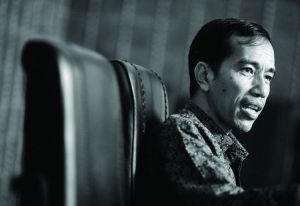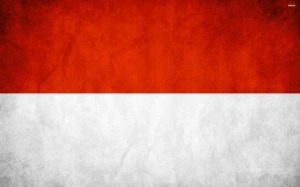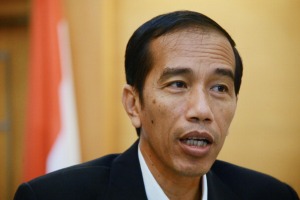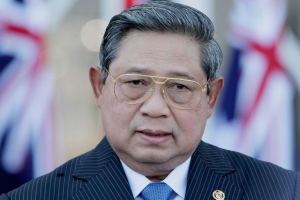October 23rd, 2014.

Indonesia today
[caption id="attachment_254" align="alignnone" width="300"]
 Flag of the Republic of Indonesia[/caption]
Flag of the Republic of Indonesia[/caption]
Joko Widodo, popularly known as Jokowi was sworn in as the President of Indonesia on Monday October 19th 2014.Jokowi is the seventh Indonesian President since the final eviction of the Dutch colonialists in December 1949. http://en.wikipedia.org/wiki/Indonesia. Although independence had actually been declared in August 1945, Indonesia is the world's fourth most populous nation with an estimated population of just over 250 million people exceeded by only China, India and the USA. According to the CIA fact-book, Indonesia comprises an archipelago of more than 17,000 islands, of which approximately 6,000 are populated. More than half the Indonesian people live on the island of Java (57%) and more than 80% of the population are Muslim, but the population is an incredibly intricate and diverse tapestry of different ethnic and cultural groups, the CIA fact-book states that more than 700 languages are spoken across Indonesia.
In terms of human and social development, Indonesia seems to have passed through the most difficult stages of development and appears to stand at the edge of tremendous growth and prosperity if the growth can be managed responsibly and with an eye on the long term. The CIA fact-book states that literacy is above 90% for both sexes that almost all the urban population has access to “improved” drinking water, but this falls to only three quarters in rural areas.
Who is Jokowi?
Jokowi is the populist and apparently incorruptible Governor of Jakarta, former mayor of Surakarta.
Prior to entering Politics Jokowi studied and ran small businesses with mixed success. As a politician he has clearly been a resounding success and as the leading figure in the Indonesian Democratic party Struggle. He belongs to the populist tradition in Indonesia, a faction that has essentially been engaged in a power struggle against the Indonesian Military (TNI) since the nation's foundation. This is a power struggle that has been dominated by the Military faction, General Suharto ruled Indonesia for more than 30 years after ascending to power in a CIA approved military coup in 1965.
The thing that really sticks out regarding Jokowi's background is that unlike so many of his predecessors and indeed his Presidential electoral rival Praboyo Subianto, he has never lived overseas as far as I can tell. He has not been “inducted”: into the mindset of the Western elite. He is completely lacking in the Oxford sojourn, the visiting fellowship at the Brookings Institute, the study at the Royal United Forces Institute. The IMF posting. You get the idea.
Predecessors and rivals. A Stark Contrast.
[caption id="attachment_256" align="alignnone" width="731"]
 The Departing President SBY[/caption]
The Departing President SBY[/caption]By way of contrast, Jokowi's predecessor Susilo Bambang Yudhoyono managed two stints of military training in the United States. In 1975 he attended Fort Benning,and took the Airborne and Rangers course, he returned in 1981-82, and took the “ Infantry Officer Advanced Course at Fort Benning and in training with the 82nd Airborne Division. also spent time in Panama and went through the jungle warfare school. “http://en.wikipedia.org/wiki/Susilo_Bambang_Yudhoyono
Jokowi's electoral rival Praboyo had a similar experience, Praboyo attended the Advanced Infantry Officers Course at Fort Benning in the southern US state of Georgia in 1985.
[caption id="attachment_257" align="alignnone" width="691"]
 The Defeated Candidate Prabowo. His history is more than a little sinsiter. Will his backers seek revenge?[/caption]
The Defeated Candidate Prabowo. His history is more than a little sinsiter. Will his backers seek revenge?[/caption]The very candidacy of Praboyo was in fact something of an insult to the Indonesian people and a potent symbol of the power exerted today by the worst elements of the former Suharto military regime.
Praboyo appears to have been Suharto's most ruthless and violent henchman “disappearing” Democratic activists sometimes and on other occasions simply murdering activists as a warning to others. While many Indonesians may prefer to excuse or ignore the criminal excesses of the TNI during their Occupation of East Timor, Praboyo's crimes were committed against any and all who threatened the Security of the State, most of the crimes he oversaw were in East Timor, but the same wicked tactics were used against peaceful Javanese activists right up until Suharto's May 1998 fall from power Praboyo was trying to stem the tide of Democracy by imprisoning people and murdering them after having tortured them. “Troops under Prabowo's command kidnapped and tortured at least nine democracy activists in the months before the May 1998 Riots” and were “also suspected of organising the 1997–98 activists kidnappings in Indonesia of another 13 activists (who all remain "missing") between February 1997 and May 1998 http://en.wikipedia.org/wiki/Prabowo and http://en.wikipedia.org/wiki/1997%E2%80%9398_activists_kidnappings_in_Indonesia
The Praboyo candidacy almost appears as though the “TNI faction” chose the candidate with the most criminal history because if he won, he'd have even more to lose from any loss of the immunity of the military.
the Jakarta Post and the Guardian-Divergent Views of Corruption
Commenting on Yudhoyono's legacy Margareth S. Aritonang writing in the Jakarta Post of October 20th, 2014 stated
“ During his 10 years leading the government, outgoing President Susilo Bambang Yudhoyono has developed the Indonesian Military (TNI) by increasing its budget and endorsing regulations that strengthen its authority, but has done nothing to make sure the military becomes more accountable to higher powers.
“Yudhoyono’s lack of concrete action to reform the TNI has protected the institution from law enforcement efforts, nurtured its culture of impunity and, in contrast to other state institutions, left it untouched by the Corruption Eradication Commission (KPK).”
“Unlike his obvious attempt to improve the TNI through soaring funding that reached Rp 95 trillion (US$78.4 billion) in the proposed 2015 state budget, the largest amount given to any state institution, Yudhoyono had apparently ignored plans to amend the 1997 Law on Military Tribunals throughout his leadership terms. “
“Critics believe that the amendment would lay the foundation for a progressive change within the TNI as it would allow external oversight to enforce accountability and transparency.”
“Nothing was heard of the fate of the amendment until today, although reports of soldiers committing crimes continued to touch the nerves of the Indonesian public, especially last year when 12 members of the Army’s Special Forces (Kopassus) brutally murdered four detainees at the Cebongan Penitentiary in Yogyakarta.”
“As long as the 1997 military tribunals law remains intact, the TNI will be able to keep dealing with the misconduct of soldiers as an internal affair.”
“Reform within the military institution will never take place as long as the [military tribunals] law is maintained,” Wahyudi Djafar from the Institute for Policy Research and Advocacy (ELSAM) said recently.
“A lack of control over the TNI’s enormous power will enable soldiers to take excessive measures in the name of state security,” he emphasised.
From this I think that it can be concluded that President Yudhoyono was rather reluctant to encroach on his former Military colleagues or take any actions against their wishes. This is a very perilous issue for Jokowi, if he displeases the TNI with reforms that make the military legally accountable, there is a strong likelihood that “rogue elements” of the Indonesian military will seek to destabilise the nation and the Jokowi leadership by engaging in a campaign of “synthetic terrorism,” and/or igniting sectarian violence in one of the many socially vulnerable areas of the vast and tremendously diverse nation.
The Guardian’s Simon Tisdall described Jokowi as “a political outsider determined to confront the moneyed, self-serving ruling elites of the nation’s capital “ the comment on corruption that follows is telling. “a country where corruption is said to be rife.” But the Guardian has not apparently been able to determine the veracity of these allegations at this point in time. They have heard the rumours but they are not yet sure!
The contrast between the honesty of the Jakarta Post as opposed to the obfuscation of the Guardian tends to indicate two obvious things.
1. The Indonesian people are sick of Corruption and Malfeasance on the part of public officials. The Military are still somewhat above the law and are apparently unwilling to be accountable to public officials or for public monies. (Jakarta Post)
“ exempted military personnel from being investigated by the KPK (National Corruption Commission) over any alleged misuse of the huge amount of state money granted to the organisation. In 2012, the Defense Ministry was in the spotlight over alleged irregularities in the $470 million procurement of six Russian-made Sukhoi Su-30MKK fighter planes that might have caused $50 million in losses to the state, an allegation quickly denied by the government.”
2. Western elites, are perfectly happy with corrupt military rule in Indonesia and the consequences faced by the Indonesian people are simply irrelevant.
President Jokowi will face a number of pressures from numerous power groups, both locally and internationally
Economic Reform-the Fuel Subsidy is Very Controversial.
Several Jokowi aides have indicated that one of the first Economic reforms President Jokowi intends to implement is to cut the government fuel subsidy which some describe as expending at least 14% and as much as 25% subsiding the lifestyles of the middle class. Joko claims that he plans to divert the savings gained by cutting the subsidy to Health and Education services and also towards improved infrastructure. Jokowi aides have criticised the outgoing President Yudhoyono failure to implement this reform. Will Hickey writing in the Jakarta Post this February had a different view of the issue. writing
“all Indonesian economic activities, from cheap discount flights to Bali, to buses, trucks and cars on the Jasa Marga toll roads to the gridlock in Sudirman and Blok M, to ojek (motorcycle taxis), to container ports in Surabaya and the electricity generated by the state power monopoly PT PLN, are predicated on the availability and low costs of subsidised fuels.
“Unfortunately, all subsidy reform to date — as studies by the likes of the World Bank and International Monetary Fund (IMF) show — has only discussed a strategy for raising prices on the consumer.
“A 2012 updated International Institute for Sustainable Development (IISD) study titled A Citizens’ Guide to Energy Subsidies in Indonesia, mentions a problem with hidden producer subsidies (such as tax incentives, investment credits and domestic market obligations), but goes on to mostly indict the consumer as the largest culprit.
“The study does acknowledge that hidden producer subsidies are just too difficult to pursue. So that is the entire strategy: Ignore deeper issues and stick it to the consumer as “the rich” may benefit unjustly. “ ominously Mr Hickey notes that “No one is willing to take a heavy hand with the fuel subsidy issue before the election, but the markets will force them to do so after. “ The enthusiasm for this reform or these cuts is very strong amongst the Western Financial Papers, and we can assume that the objections to the subsidy from the likes of the Wall Street Journal (http://online.wsj.com/articles/new-indonesia-leader-looks-to-tackle-fuel-subsidies-1413793138) and Bloomberg (http://www.bloomberg.com/news/2014-08-28/widodo-committed-to-reducing-indonesia-fuel-subsidy-after-rebuff.html) are not borne out of their concern for the car-less Indonesian working class or anything similar. It doesn't fit the models they proscribe.
Regardless of the merits of this change, the Widodo government is likely to face harsh judgement and coercion from the Bankers if they fail to cut the subsidy, and will probably face demonstrations and much internal anger if they go ahead. Jokowi's ability to work with these divergent interests without alienating either group will probably be his first major challenge.
International Relations. A Likely Secondary Priority.
Despite the thirty year stint under a CIA strongman, Indonesia is a founding member of the Non Aligned Movement (NAM), the major challenge of the Jokowi government will be similar to the challenge facing Australia and many other regional nations. The challenge is to manage China's ascent and the United States relative decline in as non-violent way as possible. It is not in the Indonesian interest that US China rivalry be allowed to descend into armed clashes of any kind.
There is little doubt that in International relations the Jokowi government will opt for moderate and conciliatory policies that seek to minimise conflict between nations. The foreign policy is likely to be business as usual, with other policy areas having precedence.
Everyone knows what Indonesia needs.
Indonesia 's needs and the needs of the Indonesian people are the same as anywhere else. Indonesia needs development and stability and the curtailment of political and military corruption will strengthen the state immeasurably. Indeed, rogue military elements, far from being the “protectors of the nation” represent the only real threat to the Indonesian state's stability and development along with their Western Intelligence allies. .
It is one thing for an individual such as Jokowi to be “clean” but ensuring that entrenched systemic corruption is addressed may well be beyond President Jokowi's reach. Ultimately President Jokowi will be judged on his ability to represent the interests of the Indonesian people in the face of the threats and demands of Western Neo-Liberals and the entrenched corrupt Indonesian power elite whilst maintaining peace and stability. We should all wish him well.
James Robertson. .
No comments:
Post a Comment